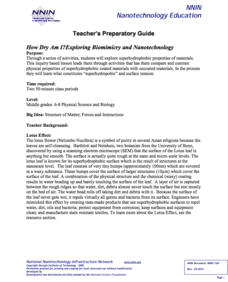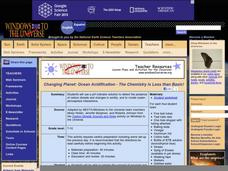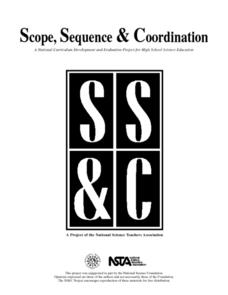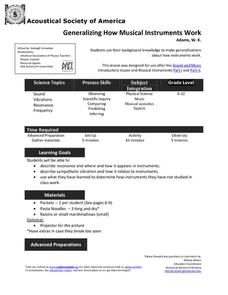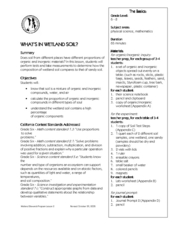Science 4 Inquiry
The Ups and Downs of Populations
Life has its ups and downs ... especially if you're an animal! Biology scholars engage in a population study through an inquiry-based lesson. Pupils work together to explore the factors that affect deer populations, then examine the...
Science 4 Inquiry
The Classification of Living Things
It's a classification sensation! Demystify why we classify using an inquiry activity that helps your class sort things out. Groups begin by classifying a variety of shoes before they research organisms and design their own dichotomous...
National Nanotechnology Infrastructure Network
How Dry am I? Exploring Biomimicry and Nanotechnology
Help your classes feel like they can walk on water! An engaging inquiry-based instructional activity has young scholars experiment with different surface coatings. They make observations about their properties and how they relate to the...
Curated OER
Changing Planet: Sea Levels Rising
Begin by showing a six-minute video, Changing Planet: Rising Sea Level as an anticipatory set. Pupils draw a topographic map of a potato continent. Finally, they will visit NOAA's sea levels online map and NASA's carbon dioxide...
Curated OER
Changing Planet: Ocean Acidification - the Chemistry is Less than Basic!
A video and laboratory investigation are highlights to this activity on acidification of ocean water due to increased atmospheric carbon dioxide. Using bromothymol blue (BTB) as an indicator, pupils analyze the amount of carbon dioxide...
National Nanotechnology Infrastructure Network
Understanding Wave Motion - Slinky vs. Snaky: Which Spring is Dominant?
Ride the wave to an understanding of refraction! The first in a series of two inquiry-based lessons challenges learners to create transverse waves with two different types of springs. As their wave hits an object, they observe the change...
US Environmental Protection Agency
Weather and Climate: What's the Difference?
Future weather forecasters collect daily temperatures over a period of time. Afterward, they compare their data with monthly averages, as researched on national weather websites, in order to grasp the difference between weather and...
University of California
Hot! Hot! Hot!
Calories are not tiny creatures that sew your clothes tighter every night, but what are they? A science lesson, presented at multiple levels, has learners experiment with heat, heat transfer, and graph the function over time. It also...
Cornell University
Magnetic Mad Libs
Examine the science behind computer communication. After defining the properties of magnets, learners simulate how a computer hard drive works by sending each other binary codes using the magnets. They use these communications to...
Curated OER
Oils and Plastic
Peruse the properties of polymers with your materials engineers, chemistry aces, or emerging ecologists. The inquiries in this resource include puncturing polyethylene plastic bags, dissolving polystyrene cups, creating a polymer ball...
Towson University
Berries...With a Side of DNA?
Sometimes science lab can be ... delicious! Middle school science scholars extract DNA from strawberries and other fruits in an engaging lab activity. The teacher's guide includes pacing, materials list, and worksheets with answer keys.
Curated OER
Planet Impact!
An amazing information-packed lesson plan allows your space scientists to crash a virtual comet into Jupiter and learn how the angle, distance, speed, and mass influence the outcome. Click on "Back to the Lesson" to access the...
Acoustical Society of America
Generalizing How Musical Instruments Work
Sound, vibrations, resonance, and frequency are explored as learners use music to foster scientific inquiry. They engage in three different sound experiments and follow up discussions to foster a better understanding of how musical...
Curated OER
Household Conservation/Efficiency
Hook your class up to an online home energy usage calculator so that they can estimate the amount used per month by their families. Then give them Watt meters with which they will measure the power consumption of several small...
Baylor College
Body Strength
Your young learners will discover how muscular strength and endurance can increase with this truly hands-on activity! Beginning by writing an acrostic for the word strength, class members then engage in tracking their ability to squeeze...
Cornell University
Fibers, Dyes, and the Environment
Nanofibers can be made through electrospinning or force spinning in order to reduce the negative impact on the environment. Pupils study the role of fibers and dye on the environment through a series of five hands-on activities. Then,...
Curated OER
Science is a Wonderland
Young scholars use the scientific method to study Animalia and Plantae Kingdoms. In this science inquiry lesson, students watch a PowerPoint about science process skills. Young scholars complete the National Geographic bottled...
Curated OER
Documenting Science Through an Active Inquiry Process
Pupils follow procedures regarding scientific data collection. In this scientific inquiry lesson, students investigate inquiry questions through research and data collection. Pupils use technology tools to create products that feature...
Curated OER
Comparing Microscopic Organisms in Fresh and Polluted Water: An Invitation To Inquiry
Students have the opportunity to develop and formulate ideas and explanations through the scientific standard of inquiry. They identify organisms by using an identification key for specific aquatic geographical area.
Curated OER
What's in Wetland Soil?
Students examine the organic and inorganic components of soil. In this environmental science lesson, students identify the factors that influence soil formation. They collect soil samples, conduct tests, and analyze the results.
Curated OER
Inquiry
Students read and discuss the main points in the paragraphs about trees, fruit orchards, primary forests, and data. In this inquiry discussion lesson plan, students discuss how to pick out the main points of science related information.
Curated OER
The Science of Microbes (Observing Different Microbes)
Students use their observation and inquiry skills to understand microbes. In this microbiology lesson, students explore slides with a microscope. Students gain experience with preparing slides and proper use of a microscope while...
Curated OER
Junior Solar Sprint Series: Electrical Power
Through scientific inquiry, middle schoolers discover how to arrange solar cells in order to produce electricity. This activity is intended to prepare learners to be able to design and construct solar cars. As with other resources...
Curated OER
Balloon-Powered Car
Attractive and logical instructions are provided for constructing a balloon-powered car. Young physical scientists measure the distance their car travels and record it on a pre-printed data sheet. The make alterations to improve the...
Other popular searches
- Life Science Inquiry
- Earth Science Inquiry
- Science Inquiry
- Science Inquiry Lessons
- Inquiry Based Science Lessons
- Inquiry Based Science Lesson
- Earth Science Inquiry Rocks
- Nature of Science Inquiry
- Earth Science Inquiry Water
- Life Science Inquiry Fossils
- Earth Science Inquiry Maps
- Life Science Inquiry Frogs




